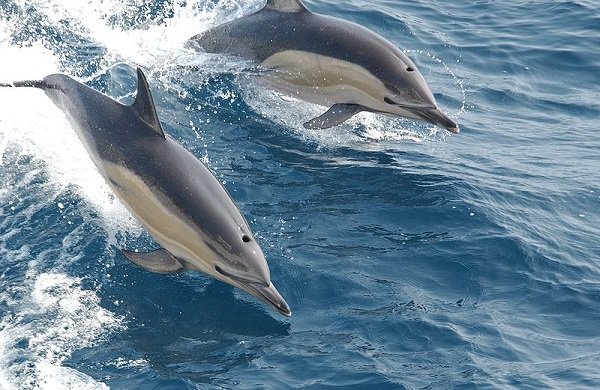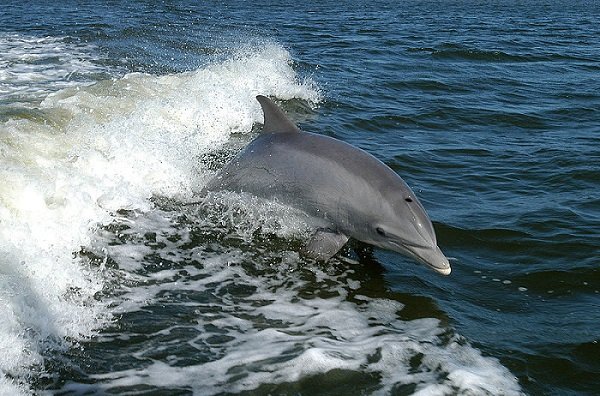Hello smart Steemians!
Our planet is very unique place. In addition to the amazing plant kingdom (or Plantae) impressing with their diversity and magnificence, the animal kingdom (or Animalia) is even more impressive. Many animals are superior in their characteristics to humans, for example in weight, strength, number of teeth, ability to survive in difficult climatic conditions. Also many animals are endowed with unique abilities, which only they have. And today I want to talk about some of these "unique" animals, about dolphins.
Dolphins are one of the most handsome representatives of the animal kingdom. I think these animals are capable of causing only positive emotions.
According to the ancient Greek legend, the "dolphin" was called the animal in which Apollo turned, in order to show people the way to Delphi, where then was founded the famous Delphic oracle and temple. Translated from the ancient Greek δελφίς comes from the word δελφύς (uterus), literally means "uterine", that is "fish" with the uterus.

Common Dolphin, NOAA NMFS(Public Domain) - Image from:commons.wikimedia.org
General description
Oceanic dolphins or Delphinidae are a broadly distributed family of dolphins that live in the oceans. Representatives of family occur in all oceans and seas, as well as in some river systems. River dolphins are relatives of the Delphinoidea. All dolphins are perfectly floating and can develop speeds up to 55km/h (34 ml/h).
Dolphins are characterized by the presence of a fairly large number of homogeneous conical teeth in both jaws, both nasal apertures connected usually to one transverse aperture of the semilunar form on the top of the skull, the head relatively small, often with a pointed muzzle, the body elongated, there is a dorsal fin. The length of the body is 1.2-3m; in some species it can reach 10m (32ft), weight is from 50kg (110pound) and can reach even to 700kg (1543pound). They are very agile and dexterous. It is often possible to see how flocks of dolphins swim behind ships. They are distinguished by curiosity and a good attitude to man.
Dolphins mainly feed on fish, shellfish, crustaceans. When searching for food they use echolocation and have a developed sound signalling.
Life expectancy is 30 years for small sizes dolphins and about 50 years for all others. Pregnancy period of dolphins is lasted 10-18 months. A female usually brings one cub in length of 50-60cm (20inch) and protects it for a while. Scientists observed that in some cases the cubs do not sleep at all for the first month of life, forcing the females to be active all this time too.
Unique abilities of dolphins
The surprising property of the dolphin's organism is the rapid healing of wounds. Even with deep and serious damage, dolphins do not bleed. These marine dwellers can use their diving abilities to the depths and thereby delay the flow of blood until the clotting begins. The wounds of dolphins do not become infected. The skin and subcutaneous fat of mammals contain antibacterial substances that prevent the development of infection in the wound. The healing properties of the dolphin body are also unique. Even in the place of wounds the size of two soccer balls the fabric is replaced completely. One more of dolphins’ amazing ability is to dive to depths of up to 300meters (984ft) without signs of caisson disease.
Decompression sickness or DCS, also known as divers' disease, the bends, aerobullosis, or caisson disease. A disease that mainly arises from the rapid decrease in the pressure of the inhaled gas mixture, as a result of which gases dissolved in the blood and body tissues (nitrogen, helium, hydrogen, depending on the respiratory mixture) begin to be released as bubbles into the blood of the affected person and destroy the walls of cells and blood vessels, block blood flow.
It is known that when immersed in depth, the water pressure increases every 10 meters per atmosphere. At a depth of 300 meters per square centimetre of the dolphin's trunk force is 30 kilograms. For a human, diving even for 100 meters threatens with danger.
Gray’s Paradox
Dolphins can swim at a very high speed. In 1930s, the Englishman James Gray was surprised by the unusually high speed of dolphin swimming: 37km/h according to his measurements. Having made the necessary calculations, Gray showed that, according to the laws of hydrodynamics, for bodies with constant surface properties, dolphins should have several times more muscle power than observed in them. Accordingly, he suggested that dolphins know how to control the streamlining of their bodies, while retaining laminar flow around the speed of movement, for which it should already become turbulent. In United States and Great Britain, after the Second World War, scientists began researches to prove or disprove this assumption. In USA researches practically ceased in the period from 1965-1966 until 1983, because erroneous conclusions were drawn on the basis of incorrect estimates that the "Gray’s paradox" does not exist, and dolphins have enough muscular energy to develop such a speeds.

Bottlenose Dolphin, image from- Author, NASA(Public Domain)

Dolphins' communication is expressed in sound impulses and ultrasound. They can reproduce variety of sounds: whistling, twittering, buzzing, squeaking, yelping, smacking, clicking, screeching, clapping, roaring, screaming, creaking, etc. Signals are emitted at very high ultrasonic frequencies that are inaccessible to human hearing. Sound perception of people is in the frequency range up to 20 kHz, dolphins use a frequency of up to 200 kHz. In the speech of dolphins, scientists have already counted 186 different "whistles". Also, in 2006 the group of British scientists from University of St.Andrews came to the conclusion that each dolphin in the flock has its own name and responds to it. None of the other animals has this ability.
Nature has endowed dolphins with unique ears which acting according to the principle of the echolocator. Very often hearing replaces vision to dolphins. This awesome ability helps dolphins find food at night or in troubled waters, to avoid dangers in the form of predators and not to run into obstacles.
Development of the brain and intellect
The size of the dolphins’ brain in relation to their body size is much larger than that of chimpanzees, and their behaviour indicates a high degree of mental development. The brain of an adult dolphin weighs about 1700grams (3.74pound), while a human’ brain has an average of 1400grams (3.08pound). Swiss scientists, who conducted studies of the abilities of animals, found that in terms of intelligence dolphins occupy the second place after a human. So, what are the intellectual abilities of dolphins? First of all, it is worth noting the rapid learning abilities. Performing commands dolphins sometimes learn even faster than dogs. It's enough to show the trick 2-3 times and dolphin will easily repeat it. In addition, the dolphins are very creative. The animal is not only able to fulfil the task of the trainer, but also to do some tricks on own way.
According to the latest scientific data of cognitive ethologic and zoo psychology, dolphins not only have a "vocabulary" of up to 14,000 sound signals that allow them to communicate among themselves, but also have self-awareness, "social cognition" and emotional sympathy, a willingness to help newborns and sick, pushing them to the surface of the water. It is also surprising that the brain of dolphins never sleeps. The right and left hemispheres of the brain rest alternately. After all, the dolphin must always be on the alert: avoids predators and periodically floats to the surface for breathing.

Some scientists believe that the mental capabilities of dolphins are too overrated. For example, Justin Gregg, a science writer, who writes about animal behaviour and cognition, in his book "Are dolphins really smart?" said - yes, they are smart. But not smarter than many other animals.
In 2012, in Canada was held a forum at which specialists in Philosophy, Conservation and Animal Behaviour gathered and decided that the Dolphins should be treated as "personalities", and their rights to life and freedom should be respected. They are confident that dolphins and whales have sufficient intelligence to justify applying to them the same ethical principles as to humans. Recognizing their rights would mean the end of whaling and captivity, as well as the use of dolphins and whales for entertainment. Experts believe that not being human beings, dolphins and whales are "people" in the philosophical sense of the word, and this in itself makes one seriously think about the attitude towards them.
Tom White, the professor of ethics of the University of Loyola Marymount (Los Angeles), author of the book "In defence of dolphins: a new moral milestone" believes that dolphins, although "not people, but individuals."
"Personality needs individuality. If we take this into account, then the deliberate killing of such an individual is ethically analogous to the deliberate killing of a human being," says Tom White.
References:
- http://www.onegreenplanet.org/animalsandnature/human-intelligence-versus-whales-and-dolphins/
- https://www.nationalgeographic.com/magazine/2015/05/dolphin-intelligence-human-communication/
- http://www.spiegel.de/international/world/scientists-dolphin-intelligence-may-be-overrated-a-924614.html
- http://www.oxfordscholarship.com/view/10.1093/acprof:oso/9780198528272.001.0001/acprof-9780198528272-chapter-20
- http://www.hunter.cuny.edu/communications/pressroom/news/scientists-to-probe-dolphin-intelligence-using-an-interactive-touchpad

I love dolphins so much. Very interesting post. Thank you
Thanks!
I think they are very smart, smarter than many other animals)
Thank you for your comment!
Dolphins are unique animals, besides mental abilities, they also have a big kindness. There are many known cases when dolphins saved people. I think they deserve to be called as personalities
Thanks for your reply!
Hi @biologist
Thank you for using the steemstem tag.
Please note that some of the images you use have copyright issues and I would recommend that you replace them.
You can read here how to find free-to-use, high quality images for your posts.
--
Steemstem is a community aiming to support posts about Science, Technology, Engineering and Mathematics.
We welcome new members interested about STEM on our discord channel
Katerina
Thank you!
This post has been upvoted and picked by Daily Picked #45! Thank you for the cool and quality content. Keep going!
Don’t forget I’m not a robot. I explore, read, upvote and share manually 😊
You can upvote, follow, resteem, delegate and join my curation tail to support me, good creators and minnows.
5 SP 10 SP 20 SP 30 SP 40 SP 50 SP 60 SP 70 SP 80 SP 90 SP 100 SP
Thank you!
Thank you!
Congratulations @biologist! You received a personal award!
You can view your badges on your Steem Board and compare to others on the Steem Ranking
Do not miss the last post from @steemitboard:
Vote for @Steemitboard as a witness to get one more award and increased upvotes!